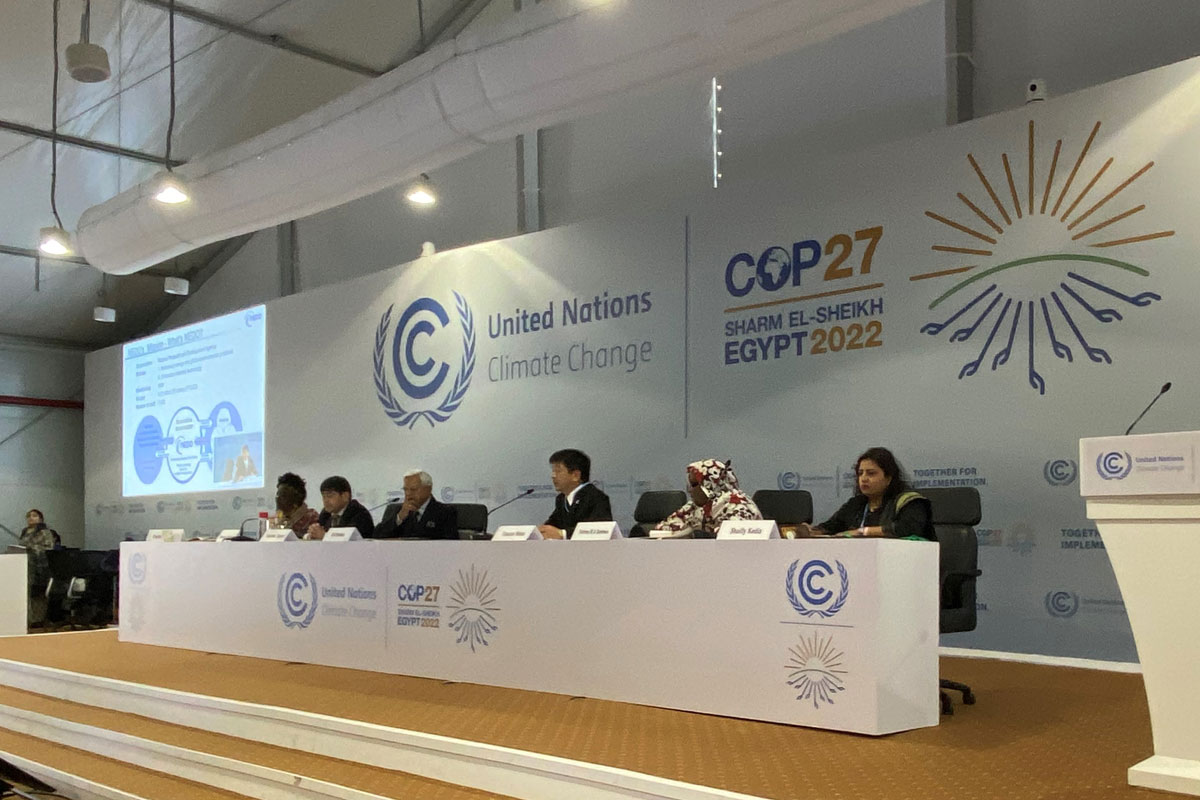ICEF participated in the official side event and the Japan Pavilion of COP27 The official Low Carbon Ammonia Roadmap and a draft of Blue Carbon Roadmap were released
The 27th UN Climate Change Conference of the Parties (COP27) was held in Sharm El-Sheikh, Egypt from Sunday, November 6 to Friday, November 18, and ICEF participated in the official side event and the Japan Pavilion. In addition to releasing the official Low Carbon Ammonia Roadmap, a draft of which was presented at ICEF2022, and a draft of the Blue Carbon Roadmap, an outline of which was presented at ICEF2022, these events also focused on Africa, the host country of COP27, with international organizations such as IRENA and UNIDO, and a Kenyan NGO as speakers to discuss how to achieve global carbon neutrality.



1. The UNFCCC official side event, titled, "Climate Action through Innovation, Implementation and Inclusive Multi-level Governance"
ICEF co-hosted this event with TERI School of Advanced Studies (TERI SAS), the Indian higher education institution specializing in the field of sustainable development, and the Indigenous Information Network (IIN), the Kenyan organization working on the protection and development of Indigenous Peoples and local communities. TERI SAS, IIN, and ICEF made presentations and had discussions for achieving carbon neutrality globally, from each perspective; a government agency, a technology research institution, and an organization supporting developing countries.
From the perspective of a government agency supporting and promoting innovation, ICEF presented roadmaps featuring “Low-Carbon Ammonia” and “Blue Carbon”, technologies with the potential to contribute significantly to long-term Net Zero Emissions. During the panel discussion, speakers exchanged views on the necessity to work simultaneously toward gradual CO2 emissions reductions and economic development on a global scale in order to achieve carbon neutrality globally, and discussed the importance of adequate funding to accelerate cutting-edge innovation in academia and business, and international cooperation based on an understanding of national and regional diversity.
Please check this event on the official UNFCCC YouTube.
https://www.youtube.com/c/UnfcccInt/playlists
2. The Japan Pavilion
Ministry of Economy, Trade and Industry (METI) and New Energy and Industrial Technology Development Organization (NEDO) jointly hosted an ICEF-related seminar and presented two roadmaps. Including Mr. David Sandalow, ICEF Steering Committee member, and Mr. S. Julio Friedman (Carbon Direct), who spoke at the ICEF2022 technology session on CDR (Carbon Dioxide Removal Technology), speakers from IRENA, UNIDO, and Mitsubishi Power were invited to present and discuss their initiatives to achieve carbon neutrality from the standpoints of a government agency, international organizations, and private companies.
ICEF also participated in an event co-hosted by NEDO, Japan Business Federation, the Institute of Energy Economics, Japan, and Global Industrial and Social Progress Research Institute, and gave a presentation on the roadmaps.
3. Roadmap release: “Low-Carbon Ammonia” and “Blue Carbon”
ICEF publishes innovation roadmaps for technologies with the potential to contribute significantly to long-term Net Zero Emissions every year. After a draft or an outline had been released at ICEF2022 and had reflected public comments, the official Low Carbon Ammonia Roadmap and a draft Blue Carbon Roadmap were released at COP27.
ICEF Low-Carbon Ammonia Roadmap explores a topic that Ammonia (NH3) being one of the building blocks of modern society, and examines the global ammonia industry today, strategies for reducing the cost of low-carbon ammonia production, infrastructure needs for scaling up low-carbon ammonia, different ways that low-carbon ammonia could be used to reduce emissions in the years ahead, the safety and local environmental impacts of expanding ammonia production and use, R&D needs and policy options.
ICEF Blue Carbon Roadmap defines blue carbon as the CO2 captured and stored by mangroves, tidal marshes, seagrass beds, and natural macroalgae beds as well as macroalgal farming such as kelp and sargassum. It summarizes the scientific knowledge currently available, areas of research and development expected in the future, and institutional, policy, and environmental considerations that may arise in the future, and then presents pathways to increase blue carbon absorption and reduce emissions from the loss of the ecosystems.
Please check the official Low Carbon Ammonia Roadmap and a draft Blue Carbon Roadmap in this website.
4. Reference: BNEF Summit (November 29-30)
ICEF will participate in BNEF Summit to be held in Shanghai on November 29. In this summit, the discussion will be held under the theme of China’s Green Modernization and about how the technology research and deployment that ICEF focuses on can contribute to the goal to eliminating emissions while achieving economic development. Please look forward to this session with Mr. TANAKA Nobuo, Chair of ICEF Steering Committee, Mr. David Sandalow and Ms. Changhua Wu, from ICEF Steering Committee and key stakeholders in China. The online registration is currently available from here.


